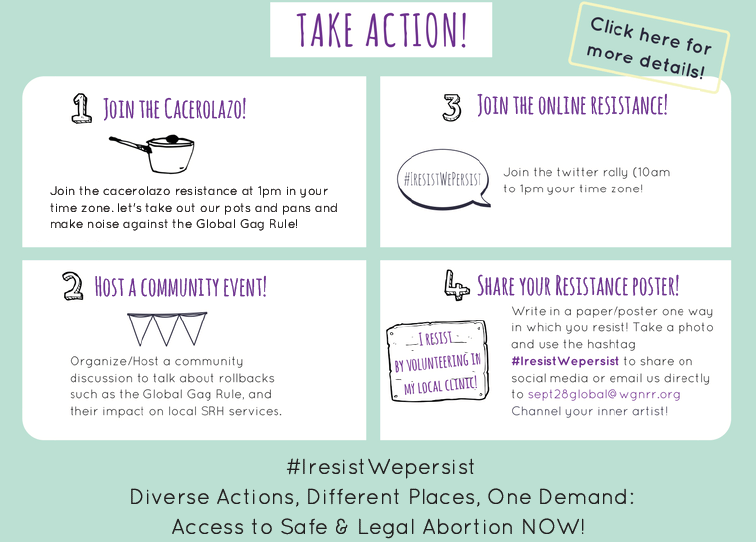
VISIT AMPLIFY | GET INVOLVED | JOIN | ISSUES | DONATE
SEPTEMBER 2017 NEWSLETTER
Advocates’ International Youth Activist Network (iYAN) consists of youth activists and adult allies from low and middle-income countries who are working to influence policies and programs in their countries and internationally to support improved youth reproductive and sexual health. Members of the iYAN connect to share information about their work; are provided information about scholarships and networking opportunities; get up-to-date information on downloadable advocacy materials and tool kits; and receive a monthly newsletter with information on advocacy, youth activism, and mobilization on important issues like sex education, access to contraception, and prevention of adolescent maternal mortality and HIV.
![]()
What’s Going on at Advocates for Youth?
Advocates Launches a New Program—The Muslim Youth Leadership Council
With the rise of anti-Muslim hate in the United States, Muslims in the United States are facing renewed discrimination and violence. Muslim immigrant youth must find ways to navigate this hostile environment at a time when they are moving through adolescence and into early adulthood. Many seek information about sexuality and sexual health but there are seldom resources that are culturally and linguistically appropriate for them to use. For many, cultural practices and social norms deem sexuality education as taboo, leaving them unable to discuss sex or their sexuality with their families or their larger community.
At the same time, LGBTQ Muslim young people experience not only Islamophobia, but also homophobia and transphobia. Islamophobic LGBTQ people and Muslims who think that LGBTQ individuals do not have a place in Islam, leave LGBTQ Muslims without community. This lack of support, stigma, and isolation leaves many immigrant Muslim and LGBTQ Muslim youth voiceless and unable to access sexual health information and services.
Driven by these dire circumstances and building on Advocates’ existing Muslim Youth Project, Advocates has created the Muslim Youth Leadership Council (MyLC). The long-term goal of the project is to create safe and supportive environments for Muslim youth, regardless of sexual orientation, gender identity or immigration status, both within mainstream Muslim communities and among U.S. communities as a whole. Specifically, this initiative aims to build the skills and resilience of a strong national cohort of Muslim-identifying young people in the United States, including LGBTQ and immigrant youth. The Council currently has 15 members who will be engaging in cultural and political advocacy at the national and community levels to build empathy and support for, and improve policies and programs that impact their health and well-being and that of their peers.
My Voice Counts!
Aplique para un premio de la Iniciativa IDEA: Innovación para los Derechos Reproductivos en América Latina
Premios IDEA buscan proyectos en fase de crecimiento temprano que quieran perfeccionar su producto o servicio y potenciar su escalamiento e impacto social, integrando su visión con la de Planned Parenthood Global, con miras a aportar soluciones innovadoras, creativas y reales para afrontar los desafíos críticos para la salud y derechos reproductivos, entre los que se encuentran la educación sexual, el embarazo no deseado, el aborto inseguro y la violencia sexual en América Latina.
Seis proyectos recibirán una beca para participar del Foro IDEA, a celebrarse el 16 y 17 de Noviembre del 2017 en Quito, Ecuador. Además podrás participar en la Etapa de Pitch Final durante el Foro IDEA. Una vez realizado el proceso de evaluación de cada pitch, se seleccionará un máximo de 3 proyectos ganadores que recibirán entre EEUU $10.000 y $15.000 en Capital Semilla para darle seguimiento al proyecto postulado. La fecha tope para presentar su idea es el 27 de septiembre. Para más información, ir aqui.
Participate in survey to inform UN/NGO cooperation for sexual diversity within the education sector
During 2012-2016, UNESCO has cooperated with a number of LGBT NGOs on research concerning sexual diversity in education. This survey tries to assess the level of involvement of civil society organizations in relation to the strategies of UNESCO and other UN organizations and the needs for further involvement and cooperation n education.The survey results will be used to develop recommendations for future cooperation between civil society and the UN. The survey is organized by GALE (the Global Alliance for LGBT Education) and RenfoCap Centre on behalf of the No-Bullying-Coalition. The deadline is October 1st, 2017. To access the survey, go here.
Apply to the open call for promising innovations to prevent gender based violence
The World Bank Group and Sexual Violence Research Initiative (SVRI) have launched a new open call for awards recognizing promising innovations aimed at preventing gender-based violence. Applications to the Development Marketplace for Innovation in Prevention of Gender-Based Violence must be received online by October 6, 2017.
SVRI and the World Bank Group will disburse more than US$1 million to advance evidence-based interventions to prevent gender-based violence (GBV) in low- and middle-income countries. An expert panel will select winners engaged in research, interventions, or other activities related to GBV prevention based on overall merit, research/project design and methods, significance, project manager/team, and ethical considerations. For more information, go here.
Apply to be a Women Deliver Young Leader
Started in 2010, the Young Leaders Program provides youth advocates with the training and resources necessary to extend their influence and actively shape the programs and policies that affect their lives. Currently comprised of 400 youth advocates from more than 100 countries, the new class of 300 new Young Leaders will join the program early 2018.
All young people between the ages of 15 and 28 are welcome to apply and can access the application here. The application closes on October 13th, and the incoming class of new Young Leaders will be selected and notified of their acceptance in December.
Tools You Can Use
The Digital 2017 World Population Data Sheet
By the Population Reference Bureau
The newly released digital version of the 2017 World Population Data Sheet ‘s special theme is the world’s youth population, with a focus on young women and adolescent girls ages 15-24. It includes key health and population indicators, as well as population projections, for the world, world regions, and more than 200 countries and territories. The landing page on www.worldpopdata.org is an interactive feature with sections containing videos and graphics on topics such as the percentage of youth who are not engaged in education or employment, growing non-communicable disease risk behaviors among youth, trends in modern contraception use among young married women, and HIV/AIDS rates among young people in sub-Saharan Africa. To access the materials, go to www.worldpopdata.org.
Understanding Menstrual Hygiene Management and Human Rights
By Human Rights Watch
This guide discusses how the biological fact of menstruation, the necessity of managing menstruation, and society’s response to both is linked with women’s and girls’ human rights and gender equality. Intended for practitioners who work directly on menstrual hygiene management (MHM) at the country level and internationally, the guide serves to position and explain the human rights framework relevant to MHM. To access the guide, go here.
Comparative Analysis: Policies Affecting Family Planning Access for Young Women in Guatemala, Malawi, and Nepal
By USAID and Health Policy Plus
This comparative analysis examined the family planning needs of young women in Guatemala, Malawi, and Nepal, and how the policy environment shapes their access to services. In all three countries, adolescents make up a significant proportion of the population, and economic and social environments place barriers in the way that these women seek to achieve their sexual and reproductive health goals. Partly as a result, compared to older women, adolescents have the lowest use of family planning and highest unmet need for services. To access the report, go here.
Méthodes contraceptives réversibles à longue durée d’action (CRLDA) pour les jeunes
Par la Collaboration sur les Capacités en Communication Sanitaire
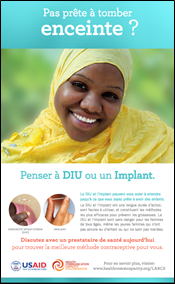 Voici une collection de matériel éducatif qui présente le DIU et l’implant comme deux options saines et fiables pour la contraception chez les jeunes. Cette collection comprend six affiches, une brochure client, une vidéo, et un guide de discussion destinés aux prestataires de santé. Ces outils peuvent être adaptés et intégrés aux formations pour les prestataires ainsi qu’aux projets en cours sur les services de contraception fournis aux jeunes.
Voici une collection de matériel éducatif qui présente le DIU et l’implant comme deux options saines et fiables pour la contraception chez les jeunes. Cette collection comprend six affiches, une brochure client, une vidéo, et un guide de discussion destinés aux prestataires de santé. Ces outils peuvent être adaptés et intégrés aux formations pour les prestataires ainsi qu’aux projets en cours sur les services de contraception fournis aux jeunes.
Vous pouvez accéder les matériels ici :
Youth-friendly Health Services Training Manual: Second Edition
By the Republic of Malawi Ministry of Health
This updated Youth-friendly Health Services Training Manual, developed by the Ministry of Health in Malawi with support from HP+, aims to improve the way service providers respond to the needs of young people and improve providers’ ability to communicate with other stakeholders to improve young people’s health. The facilitators guide and participants handbook are intended to be used for training health care providers and other professionals (such as psychologists, social workers, teachers, youth development workers, community-based distribution agents, and youth peer educators), as well as young people themselves on the special characteristics of young people and the appropriate approaches to address priority health needs.
To access the facilitator’s guide, go here.
To access the health services training manual, go here.
How to Report Human Rights Violations Faced by LGBT People to National Human Rights Institutions (NHRIs) in South Asia
By APCOM
This guidance booklet was developed for activists and LGBT communities in South Asia. It contains a series of questions and answers on the function of NHRIs in defending and protecting the human rights of LGBT citizens, including how to send a complaint. The booklet is also available in Bengali, Hindi, Nepali, Pashto, Sinhala, Tamil and Urdu. You can access the booklet in multiple languages here. And a handy pamphlet for easy printing in English here.
Read All About It!
Chile abortion: Court approves easing total ban. Chile’s constitutional court has voted to approve a bill to ease the country’s total ban on abortions. It ruled that terminations are justified after rape, if the mother’s life is at risk or if the foetus is not expected to survive the pregnancy. To read the article, go here.
India rape victim, 13, seeks curt approval for abortion. The parents of a pregnant 13-year-old rape victim from the Indian city of Mumbai have gone to the Supreme Court seeking permission to abort her baby. The girl is 30 weeks pregnant. Indian law allows terminations after 20 weeks only if the mother’s life is in danger. To read this article, go here.
Nepal outlaws menstruation huts, but what will take their place? Radhika Kami lives with her family of six in a traditional mud-and-brick house in a rural village in Nepal’s Kanchanpur district — for most of the year. For about five days each month, the 16-year-old is banished to a hut — a windowless, ramshackle shed with a small door and poor sanitation and ventilation — and is forbidden from touching other people, cattle, any fruits and vegetables that are growing, even books. To read this article, go here.
Lamido Sanusi, Kano’s ‘progressive fraud’, takes aim at child marriage in Nigeria. As the emir of Kano in northern Nigeria, one of 13 states where there is no minimum age for marriage, he is well placed to understand the issue. Yet Sanusi, a hugely symbolic religious figure, is at pains to point out that it is a social rather than scriptural problem. To read this article, go here.
‘Add Female Genital Mutilation to Domestic Violence Law’ – NAWOGA (Liberia). A local Non-governmental organization, the National Working Group Against Female Genital Mutilation (NAWOGA FGM) has described as a disservice the omission of the component of 16.21 which addresses the issue of Genital Mutilation. To read this article, go here.
Concern Over Popular Contraceptive and HIV Vulnerability in South Africa. Recent studies have shown that the three-month injectable contraceptive Depo-Provera might make people more vulnerable to contracting HIV. In South Africa, where more than 7 million people are infected with HIV, the injectable is the most commonly used contraceptive. To read this article, go here.
Pride Uganda has been crushed. Please don’t look away. Since 2012 we have celebrated Pride in Uganda. Our Pride is very different to the Pride parades in London or New York. Rather than hundreds of thousands, we have a few hundred LGBT Ugandans, and our friends who sympathise with our struggle, attending our event. We usually keep away from big public crowds and public places to avoid confrontations. To read this article, go here.
COMING UP!
September 28 is Global Day of Action for Access to Safe and Legal Abortion!
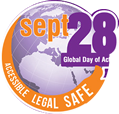 There are 1.2 billion young people ages 10-24 in the world today. Worldwide, approximately 16 million adolescent girls ages 15 to 19 give birth each year, accounting for approximately 11 percent of all births worldwide. For these girls, complications from pregnancy and childbirth are the second leading cause of death globally and unsafe abortion is an important contributor to this mortality. Adolescents are at particular risk of having an unsafe abortion–every year, some 3 million adolescent girls aged 15 to 19 undergo unsafe abortion.
There are 1.2 billion young people ages 10-24 in the world today. Worldwide, approximately 16 million adolescent girls ages 15 to 19 give birth each year, accounting for approximately 11 percent of all births worldwide. For these girls, complications from pregnancy and childbirth are the second leading cause of death globally and unsafe abortion is an important contributor to this mortality. Adolescents are at particular risk of having an unsafe abortion–every year, some 3 million adolescent girls aged 15 to 19 undergo unsafe abortion.
To mobilize for access to safe and legal abortion for all, join the September 28 Global Day of Action for Access to Safe and Legal Abortion. For over 20 years, the campaign has been a regional campaign for the decriminalization of abortion in Latin America and the Caribbean. In 2011, the campaign was globalized by the Women’s Global Network for Reproductive Rights (WGNRR) and taken on by sexual and reproductive health and rights activists from all over the world.
Participate in the WGNRR’s #IResistWePersist campaign!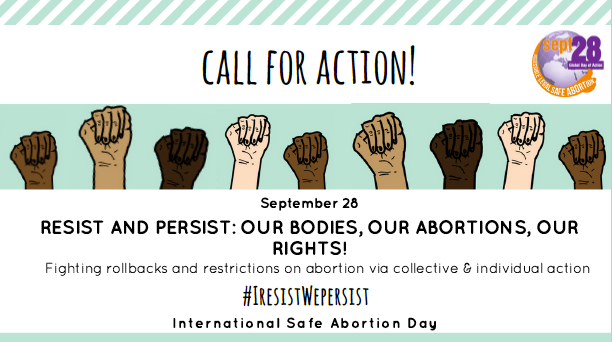
1. Join the Cazerolazo for abortion rights! At 1pm in your time zone, join by making noise against the US Global Gag Rule. Gag yourself with a piece of fabric as a reference to the Global Gag Rule, while using a pot or pan to make noise and demonstrate your resistance to any attempted restrictions on abortion services.
2. Organize a community resistance event! Organize/Host a community discussion to talk about rollbacks such as the US Global Gag Rule, their impact on local SRH services, and what kind of strategies could be implemented in your communities.
3. Join the online resistance! A 3 hour twitter rally (10am to 1 pm your time zone) promoting the messaging and hashtag of the campaign!
4. Share with #IresistWepersist: Share the ways in which you resist by sending us a message written by YOU! Organizers will create a big, virtual hub of resistance where you can see the extent of resistance happening globally in numbers and share and learn from different experiences from all over the world. Use the hashtag #IresistWepersist to share on social media
To access campaign materials and information, go here .
To find out more about the actions, go here .
To access the #IresistWepersist flyer, go here.
Participate in the International Campaign’s #LeavingNoOneBehind !
The #LeavingNoOneBehind campaign:
-
calls on the United Nations and its agencies – UN Women, UNFPA, WHO, UNAIDS, UNESCO and UNICEF, the European Union and the Ministers of Health of all national governments to make a public statement in support of International Safe Abortion Day, 28 September, as a symbolic marker of all women’s right to life and health.
-
calls on the European Union and the leaders of all national governments to follow in the footsteps of the ‘She Decides’ Initiative and commit increased funding and human resources to global public health, including for sexual and reproductive health and rights – and including for safe abortion – as part of the Sustainable Development Goals
-
calls on all the members of the International Campaign for Women’s Right to Safe Abortion to organize activities for 28 September 2017 and develop the theme #LeavingNoOneBehind in ways relevant to local contexts.
-
Campaigning themes and hashtags are here.
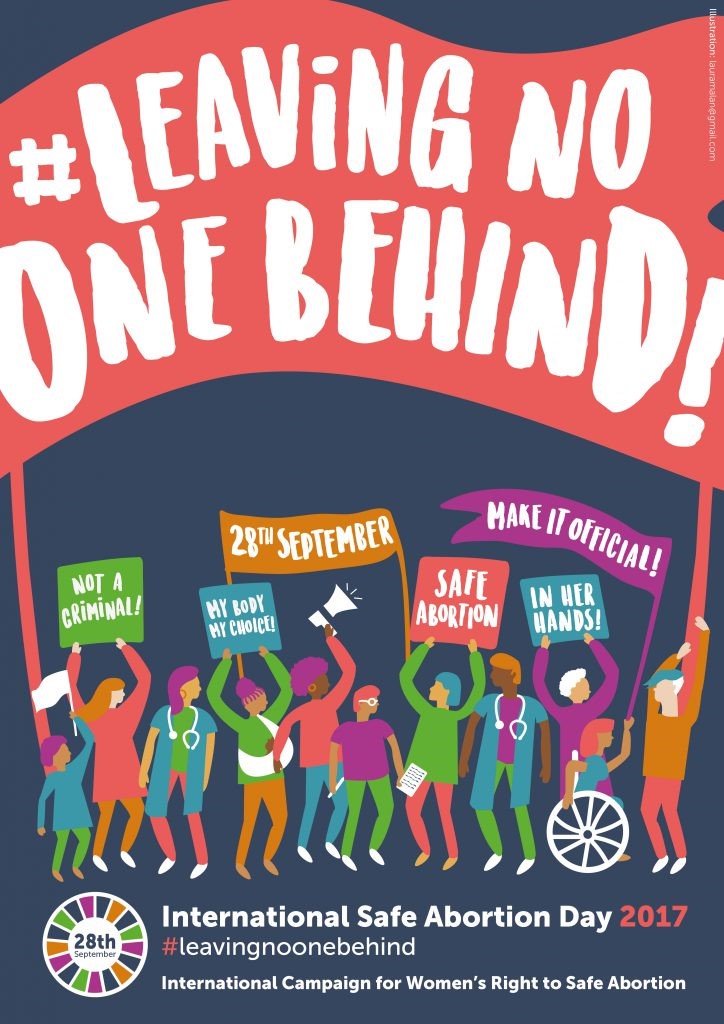
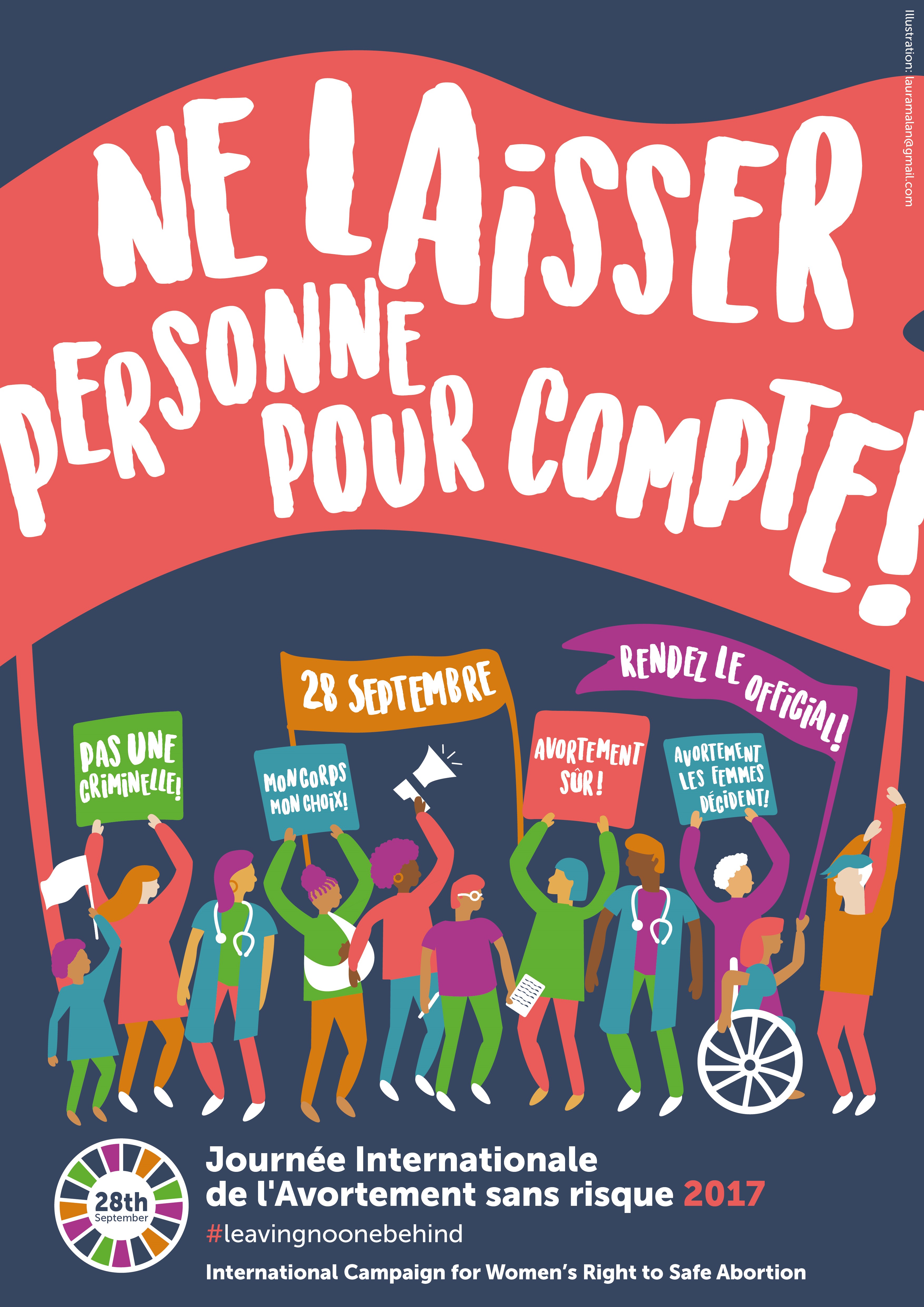

And don’t forget to check out these additional, great resources:
-
Advocates for Youth’s fact sheet, Youth and Unsafe Abortion, available in English, located here and French, here.
-
The World Health Organization’s fact sheet on preventing unsafe abortion, 2017, located here.
-
Guttmacher Institute’s global brief on induced abortion, located here.
-
The Center for Reproductive Rights World Abortion Laws Map for 2015, located here.
![]()
Please spread the word about the iYAN!
Send this link to your friends so they can sign-up too!
https://www.advocatesforyouth.org/iyan
They can also check out the iYAN Facebook page by going here:
www.facebook.com/AdvocatesforYouthiYAN
Was this e-mail forwarded to you? If so and you would like to subscribe to Advocates for Youth’s iYAN mailing list, please visit https://www.advocatesforyouth.org/iyan.
